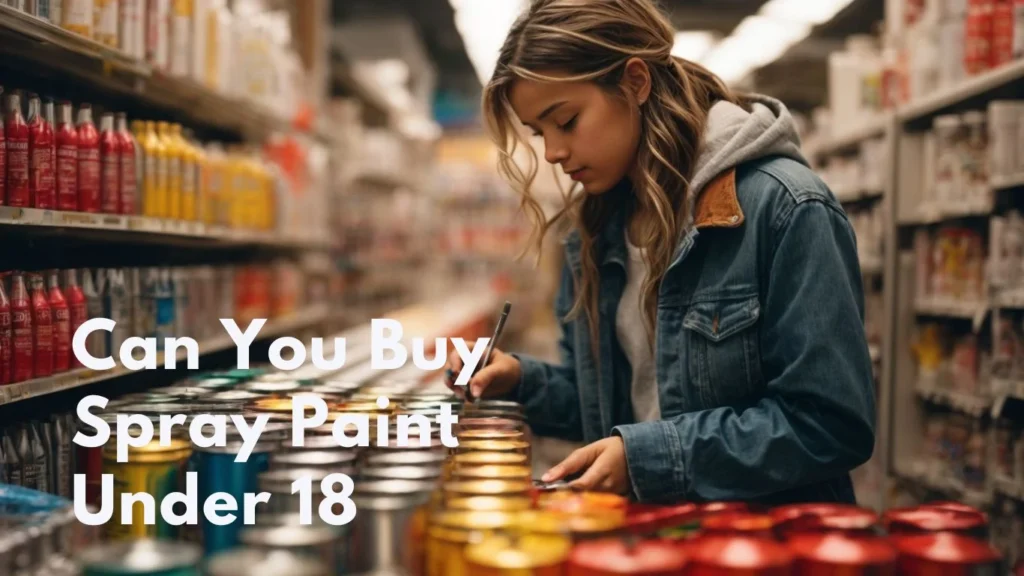Spray paint is a popular item that has many uses, from art projects to home repairs. However, spray paint also has the potential to be used for vandalism and graffiti when in the wrong hands. Because of this, there are laws and regulations around the purchase of spray paint, particularly when it comes to purchases by minors under 18.

Federal Law on Purchasing Spray Paint
At the federal level, a law prohibits the sale of spray paint to those under 18 years old. Specifically, the federal law states:
“It shall be unlawful for any person to sell or offer for sale in interstate commerce any aerosol container of paint or other substance designed to be sprayed from an aerosol can, unless such container bears a label on its principal display panel stating that sale of such container to persons under 18 years of age is prohibited by Federal law and punishable by a fine up to $10,000.”
This federal law aims to prevent minors from purchasing spray paint that could potentially be used for vandalism, graffiti, or other property damage. The law tries to limit access to spray paint by imposing fines on retailers if they are found to sell spray paint to individuals under 18.
While the federal law sets the minimum age of 18 for purchasing spray paint, states and local jurisdictions can also impose further restrictions and regulations around spray paint sales to minors.
State Laws on Purchasing Spray Paint Under 18
In addition to the federal law, some states have enacted their own laws prohibiting or limiting the sale of spray paint to minors:
California
California has some of the strictest laws regarding purchasing spray paint under 18. California Penal Code 594.1 specifically prohibits the sale of aerosol containers of paint larger than six ounces to anyone under the age of 18.
Unlike the federal law, there are no exceptions – all retailers are prohibited from selling spray paint to minors. The California law also makes it illegal for anyone under 18 to purchase spray paint. Both the retailer and minor could face civil fines for violating this law.
Washington
The state of Washington requires individuals to be at least 18 years old before they can legally purchase spray paint. According to RCW 9.91.140, it is unlawful to sell spray paint to a minor, similar to the federal law.
In addition, some cities and municipalities in Washington have enacted even stricter local ordinances around spray paint sales. For example, Tacoma prohibits all self-service displays of spray paint and requires the product to be controlled by the retailer.
Ohio
Ohio law prohibits the sale of spray paint to those under 18 but does not make it completely illegal for minors to possess it. According to Ohio Revised Code 2927.20, retailers must verify the age of any spray paint purchaser by means of photographic identification.
While minors cannot legally buy spray paint, there is no penalty in Ohio law for simply possessing spray paint as a minor. However, vandalism with the spray paint could still result in criminal charges.
New York
Under New York City Administrative Code § 10-117, it is illegal for any retailer to sell spray paint to an individual under 18 years old. Any retailer doing so could face fines up to $250 for their first offense and up to $500 for subsequent offenses.
The New York law applies to all spray paint sales within New York City limits. Like California, it makes it illegal for both the retailer to sell and the minor to purchase.
Pennsylvania
In Pennsylvania, Act 31 of 2020 specifically prohibits the sale of spray paint to minors under 18 years old. Retailers must verify age through photo ID and are subject to fines between $300 to $1,000 for violations.
Prior to this law, Pennsylvania had no state-wide restrictions on selling spray paint to minors. Several local Pennsylvania jurisdictions, including Allentown, had already enacted municipal codes prohibiting sales to minors before Act 31 was passed.
Texas
Texas has a state-wide law prohibiting the sale of aerosol paint to minors under the age of 18. Texas Penal Code § 485.031 makes it illegal for any retailer or individual to sell spray paint to those under 18 or provide it to minors.
Retailers commonly ask for photo ID from spray paint purchasers to ensure compliance with Texas law. Individuals found violating the code could be charged with a Class C misdemeanor.
Major Retailers’ Policies on Selling Spray Paint to Minors
Beyond complying with federal and state laws, many major retailers have enacted their own policies when it comes to selling spray paint to those under 18:
Home Depot
Home Depot requires spray paint purchasers to be at least 18 years old, regardless of local laws. This policy applies in all Home Depot stores across the country. Employees are instructed to verify age for any spray paint sales using a valid photo ID.
Home Depot’s national age restriction aims to ensure consistent compliance with anti-graffiti laws across all jurisdictions where it operates. This eliminates any confusion and helps protect itself from potential civil fines.
Walmart
Similar to Home Depot, Walmart requires customers to be at least 18 years old to purchase spray paint. This policy applies to all Walmart and Walmart Supercenter locations, including those in states without regulations on selling spray paint to minors.
Employees will request valid photo ID from any customer attempting to purchase spray paint and deny the sale if they are under 18. This Walmart policy exceeds legal requirements in many areas.
Target
Target’s policy is to follow all state and local laws regarding spray paint sales to minors. For example, a Target store in New York City will enforce the New York City code prohibiting sales to those under 18.
Target does not have a blanket national age restriction on spray paint purchases. However, its stores located in jurisdictions with laws limiting sales will strictly abide by those ordinances. Target train its employees on spray paint age requirements as part of its loss prevention programs.
Lowe’s
Lowe’s policy is to comply with federal and state laws prohibiting the sale of spray paint to those under 18 years old. Lowe’s will uphold any stricter local ordinances in places where they exist.
Lowe’s employees are expected to verify the age of spray paint purchasers in jurisdictions with age restrictions. However, Lowe’s does not have a nation-wide age requirement for spray paint purchases.
Ace Hardware
As a smaller retailer, Ace Hardware locations are independently owned and polices can vary. However, most Ace Hardware stores will train employees to comply with any local or state laws restricting spray paint sales to minors in their jurisdiction.
Ace Hardware does not have any uniform nation-wide guidelines. Each store owner can decide whether to implement stricter age verification policies beyond what is legally mandated.
Enforcement of Laws Restricting Spray Paint Sales to Minors
Restricting retail sales of spray paint to minors aims to deter vandalism and graffiti. However, enforcing these laws presents challenges:
- Reliance on retailers to verify age and comply with laws
- Difficult to detect unlawful sales unless caught in the act
- Penalties against retailers may not be severe enough to deter violations
- Minors can potentially steal spray paint or have an adult purchase it for them
- Does not address root causes leading to graffiti and vandalism among youth
To improve compliance, some police departments and municipalities conduct sting operations to catch unlawful sales of spray paint to minors. Local governments also try community outreach and education to ensure retailers know regulations.
Offering youth programs and legal graffiti outlets like community art walls can help provide alternatives to vandalism. But ultimately, the challenges around enforcement mean unlawful access will continue to some degree. The impact of age restrictions is limited if the broader social factors leading to misuse are not addressed.
The Debate Around Restricting Spray Paint Sales to Minors
Laws that prohibit retailers from selling spray paint to minors are controversial for some. Opponents of these laws argue:
- Age limits can negatively impact responsible, lawful usage by teens for projects, hobbies, and even employment.
- Restrictions penalize all minors without targeting actual vandals.
- Limits on legal sales will not stop determined minors from obtaining spray paint.
- Blanket prohibitions can be overly paternalistic rather than allowing for case-by-case judgment.
- Resources would be better spent on youth engagement programs and addressing root causes of graffiti.
Supporters counter that spray paint age restrictions are a reasonable protective measure, even if limited in scope:
- Age limits provide a deterrent that prevents casual, opportunistic vandalism.
- Regulations empower retailers to control dangerous products vulnerable to abuse better.
- Some minors will be dissuaded from misusing spray paint if illegal to purchase.
- Partial solutions are worthwhile if they reduce some incidents of vandalism and graffiti.
This debate will likely continue as jurisdictions weigh public safety concerns against warnings of overregulation. But restrictions remain firmly in place at both state and federal levels.


